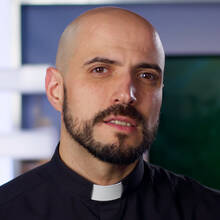A Reflection for Friday of the Twenty-First Week in Ordinary Time
“The Kingdom of heaven will be like ten virgins
who took their lamps and went out to meet the bridegroom.
Five of them were foolish and five were wise.” (Mt 25:1-2)
When was the last time you were waiting in line and the store manager came to tell you that you would be the last to be served, begged you to allow no one else to stand behind you and bribed you with a reward for your effort? This happened to me almost two years ago, when I first preached on today’s parable of the 10 virgin brides.
Craving a late night sweet something, I convinced a brother Jesuit to join me for an ice cream at one of my then-favorite ice cream parlors in the city. Admittedly, my experience of New York gelaterias was limited then—I was more impressed by the quantity of flavors than the quality of the lick. (I now consider myself something of an ice cream aficionado and know the best scoops in town, but I digress.)
We got in line just in time for the server to tell us: “You are the last person. Do not let anyone else in after you,” before promising us “a surprise” upon our entry. We were successful in our rejection of the later patrons and, indeed, received our reward. But I felt terrible after it all.
This assignment brought out the very worst in me. Each person that tried to convince me to let them cut in ahead of me, I systematically turned away, one by one. Eventually there was only me. When I finally entered the store, I quickly closed the door before the next patron could come in.
I empathize with the foolish and disorganized bridesmaids who forgot to trim their lamps, were denied the oil of the wise and prepared, and arrived late to welcome the groom. Would the Lord really shut the door on them and begrudge them this happiest of times?
We are invited to bring our unbelief, questioning and confusion into the light of our prayer each day, and to ask Jesus to help us make sense of God’s teachings as they manifest themselves in our experience.
I know it is a parable and we should avoid literalist interpretations, but I can’t get the image out of my head. It just seems so cruel and out of keeping with a God who just this past Sunday promised that the last will be first. How do we reconcile such apparently contradictory teachings?
In order to make sense of this story, we need to look for some historical context. It was common, in Jewish tradition, for the groom to visit his bride before the wedding day. The virgins were there to light the groom’s path through the dark. Once this was done, there was no need for more; anyone who came to the door in the dark would, therefore, appear shady and questionable, so when the groom does not recognize the late virgins, it is less surprising to hear that he turns the past-midnight strangers away. Although, that explanation leaves me with a new problem: Surely Jesus welcomes the stranger?
It’s helpful to remember that the divine inspiration of the Gospels isn’t primarily a matter of the method of their writing, but of the source of their truth in Jesus, his life and his teaching. And he taught, very often, in story and parable, not all of which were meant to address the same point or to mesh neatly together.
The point of Scripture is not to give us neat answers and stories that perfectly align, without contradiction or conundrum. Rather, we are invited to bring our unbelief, questioning and confusion into the light of our prayer each day, and to ask Jesus to help us make sense of God’s teachings as they manifest themselves in our experience—and sometimes even as they are in tension with our experience or with other teachings. Perhaps, in that way, the next time you go and buy ice cream, you won’t leave with regret.








